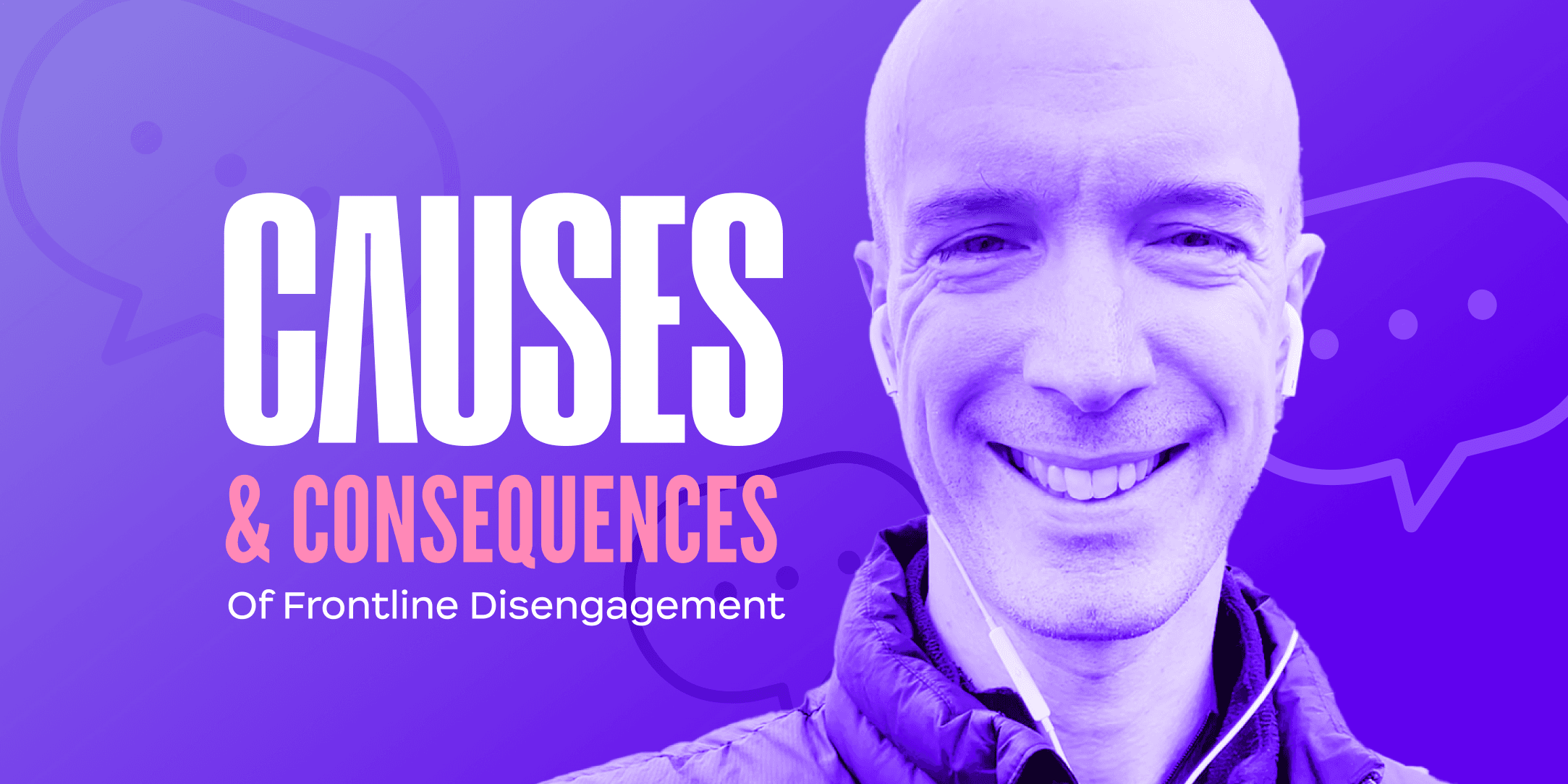Meet the frontline workers behind some of America’s most people-first cultures
What Are the Causes + Consequences of Frontline Worker Disengagement?


Simon Rutter
External Contributor - Award-winning Sr Communications Strategist
A job is never just a job. Frontline workers often wrongly get called ‘low-skilled’ and their jobs labelled ‘menial’. However, without them there are no schools, hospitals, or other critical services.
And with global economic growth moving at a glacial pace, and even reversing in some countries, now more than ever we need these workers to be engaged, productive, and profitable.
So, what are the top three causes and consequences of frontline worker disengagement?
1. Cause: Lack of recognition
Everyone wants to be appreciated at work; to know they’ve done a good job and feel valued by their company, manager, and colleagues. The great thing about recognition is it’s free, not time-sensitive (though it is best given in the moment or a timely fashion), and there is no limit to it – you can thank any and every team member, and as many times as you like.
Yet despite its ease, frontline workers repeatedly claim to feel undervalued or invisible, receiving little acknowledgment for their efforts, in stark contrast to their desk-based colleagues.
Consequences
Many and varied, and none of them good for your business. Frontline workers who don’t feel valued are more likely to be disengaged, share their frustrations with co-workers, friends, and family (impacting your brand and reputation), and look for a job where they are appreciated.
Crucially, their lack of motivation and morale will show up in reduced productivity, decreased discretionary effort (if any), and poorer customer service, all of which hurt your financials. Companies with good recognition programs have 31% lower voluntary employee turnover.
How you treat your employees is how they will treat your customers, so it’s important you recognize them regularly.
2. Cause: Poor management
There are different levels to this. For those in senior leadership roles, it’s important that your frontline workers see you frequently, that you connect them to your purpose, vision, and strategy, and that you listen to their feedback. They need consistent information and clarity from you to build trust, maintain morale, and continue delivering, yet 81% of employees say miscommunication is worse on the frontlines.
While executives are important, it’s direct bosses who have the biggest impact on engagement. Managers are supposed to provide regular steer and support, give clear direction, and create effective teamwork. A recent survey showed the top reason for employees reporting they had a bad day was a lack of help and support from their boss (40%).
Consequences
Employees can be confused about priorities, increasing the likelihood of mistakes being made and inefficiencies spreading. They can feel excluded (75% say they feel out of the loop) and struggle to find meaning in their roles. There is also a higher risk they will give mixed messages to customers, which could create further confusion and mistrust.
At a local level, poor line management leads to relationship breakdown, growing disconnection, and higher turnover, hitting your ability to service your customers in creative, innovative, and agile ways.
3. Cause: Excessive workload
Nearly two-thirds of frontline workers (58%) cite burnout as a top reason for leaving their jobs. In one of the largest studies of burnout, Gallup found the second-biggest source was unmanageable workload. Frontline workers face customers every day, and dealing with them can cause emotional harm, which can be exacerbated by reducing staff numbers or placing unrealistic targets on them.
When employees feel the demands placed on them are unachievable, and they are not listened to when raising concerns, they will retreat into survival mode, resentment will grow, and disengagement will fester.
Consequences
Unsustainably high workloads cause pressure, stress, and tension to build. Over a prolonged period, this can result in physical and mental exhaustion, health problems, and complete disconnection from your organization. It can also lead to corners being cut, putting employee and customer safety at risk.
The costs to your business are significant. You’ll see higher levels of sick leave and employee turnover, alongside lower engagement and productivity. It will be harder for you to retain good people, which will increase your recruitment costs and undermine your employer brand.
And the final kicker to keep in mind – what’s inside gets revealed on the outside, and on the frontline there is nowhere to hide from customers. Overworked and disengaged employees won’t deliver a great service, and customers will vote with their wallets and their feet.
Engaging the frontline
Frontline workers comprise 80% to 85% of the global workforce, so if they’re disengaged it will have major impacts on productivity, customer satisfaction, and performance. The good news is the top causes of frontline worker disengagement are all addressable, preventable, and reversible with positive leadership and management interventions.
